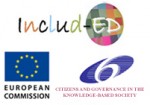The last meeting of the Advisory Committee was held on the 26th of November 2011 in Barcelona. End-users from the vulnerable groups and researchers from the INCLUD-ED team participated in it. After a presentation of the results of the final stage of the project the members of the Advisory Committee expressed their positive response to them and suggested additional points contributing to the inclusion of vulnerable groups.
The debate focused on two main ideas:
1) Structural elements, actions of social agents and policies that connect social exclusion / inclusion with educational exclusion / inclusion and
2) Contributions of local communities to social cohesion.
Regarding the first idea, the main results of Cluster 2 were presented, including interventions that demonstrate how education helps to overcome social inequalities and how education linked to other social dimensions such as employment, health, housing and political participation help people to overcome their personal difficulties, increasing their living standards. In relation to the second point, the main results of Cluster 3 were presented in the meeting. The aim of that cluster was to analyse educational projects situated in poor areas with high rates of cultural diversity in different European countries and with good educational performance.
The focus was set on the contribution of the community to the educational success based on three types of participation that lead to improvements (decisive, evaluative and educative). The members of the Advisory Committee discussed both aspects and came up with several conclusions, such as the fact that the policies implemented by the governments do not reflect the scientific progress, and that the successful actions do not reach all the groups of the population.
However, although the members of the AC saw the processes of social change among the vulnerable groups having slow repercussion, they also highlighted the fact that changes achieved serve as role model for the rest of the people, and this facilitates further changes which can arrive to more members of vulnerable groups. In this regards, and related to the second point, the AC concluded that interactive groups is the strategy that most and best works in order to obtain good educational performances, at it counts with community participation contributing to improve learning possibilities and learning interactions.
